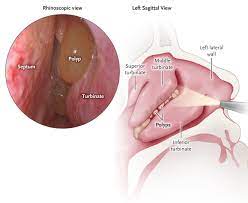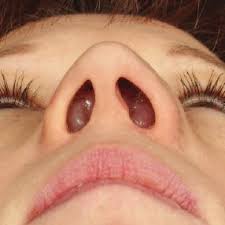Nasal Polyps


Nasal polyps are benign growths that occur in the nose. Not all nasal polyps are benign. There are multiple other causes for polyps in the nose. Some patients require biopsy to determine if their “polyp” is benign.
Symptoms & Causes
The exact etiology of nasal polyps isn’t clear. A lot of the time they are related to allergies. Depending on the extent of their polyps on exam and their history, patients with nasal polyps usually benefit from allergy testing. However, not all patients that have nasal polyps have allergies. One of the other suspected etiologies is that nasal polyps are related to an inflammatory process. The typical presentation of patients with nasal polyps is that they are losing or have lost their sense of smell and sometimes taste. When nasal polyps are large, patients will complain of trouble breathing through their nose. Some patients will also complain of a chronic runny nose. Steroids are main treatment for nasal polyps. A short course of oral steroids works well in a lot of patients. Patients might need to be treated intermittently with steroid bursts in order to shrink their polyps and help their symptoms. Nasal steroid sprays are also used to prevent further nasal polyp growth. A variety of other allergy meds can also be used. There are some new medications on the market; however, they are very expensive.
Diagnosis & Treatment
Some people do need surgery to remove nasal polyps. However, not all patients with nasal polyps need surgery. The extent of the surgery is determined by exam and usually a CT of the sinuses. Some people can undergo an in office polypectomy depending on the extent of their polyps. The biggest issue after surgery is managing patients to prevent regrowth of their polyps. Some patients have a 40-50% regrowth rate if they aren’t managed medically postoperatively. Thus, postoperative follow up not just right after surgery is important. A lot of patients postoperatively require short courses of oral steroids in order to prevent another surgery. If patients do have a significant allergy history, then they can benefit from immunotherapy – allergy drops versus allergy shots.
A subset of patients have “allergic triad” or “Samter’s triad” – nasal polyps, asthma, and allergy to NSAIDs (ibuprofen) and/or aspirin. These patients typically have large nasal polyps and require surgery. However, they have an 80% regrowth rate after surgery. Along with requiring the various medications discussed above, they benefit from aspirin desensitization to prevent further polyp growth after surgery.
Dr. Cavanaugh tries to manage patient's medically first. Not all patients with nasal polyps need surgery. He has seen some dramatic changes with steroids.
